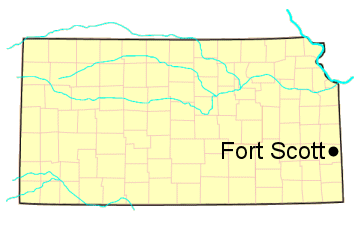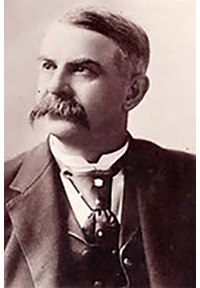Quivera--Kansas
In that half-forgotten era,
With the avarice of old,
Seeking cities he was told
Had been paved with yellow gold,
In the kindom of Quivera ---
Came the restless Coronado
To the open Kansas plain,
With his knights from sunny Spain;
In an effort that, though vain,
Thrilled with boldness and bravado.
League by league, in aimless marching,
Knowing scarcely where or why,
Crossed they uplands drear and dry,
That an unprotected sky
Had for
centuries been parching.
But their expectations eager,
Found, instead of fruitful lands,
Shallow streams and shifting sands,
Where buffalo in bands
Roamed o'er deserts dry and meager.
Back to scenes more trite, yet tragic,
Marched the knights with armor'd steeds;
Not for them the quiet deeds;
Not for them to sow the seeds
From which empires grow like magic.
Never land so hunger-stricken
Could a Latin race re-mold;
They could conquer heat or cold --
Die for glory or for gold --
But not make a desert quicken.
Thuys Quivers was forsaken;
Ane the world forgot the place
Through the lapse of time and space.
Then the blue-eyed Saxon race
Came and bade the desert waken.
And it bade the climate vary;
And awaiting no reply
From the elements on high,
It with plows beseiged the sky --
Vexed the heavens with the prairie.
Then the vitreous sky relented,
And the unacquainted rain
Fell upon the thirsty plain,
Where had gone the knights of Spain,
Disappointed, discontented.
Sturdy are the Saxon faces,
As they move along in line;
Bright the rolling-cutters shine,
Charging up the State's incline,
As an army storms a glacis.
Into loam the sand is melted,
And the blue grass takes the loam,
Round about the prairie home;
And the locomotives roam
Over landscapes iron-belted.
Cities grow where stunted birches
Hugged the shallow water-line;
And the deepening rivers twine
Past the factory and mine,
Orchard slopes and schools and churches.
Deeper grows the soil and truer,
More and more the prairie teems
With a fruitage as of dreams;
Clearer, deeper, flow the streams,
Blander grows the sky and bluer.
We have made the State of Kansas,
And to-day she stands complete --
First in freedom, first in wheat;
And her future years will meet
Ripened hopes and richer stanzas.
---Selections from Ironquill (taken from The Kansas Experience in Poetry edited by Lorrin Leland)
John Brown
States are not great
Except as men make them;
Men are not great except they do and dare.
But States, like men,
Have destinies that take them --
That bear them on, not knowing why or where.
The WHY repels
The philosophic searcher --
The WHY and WHERE all questionings defy,
Until we find,
Far back in youthful nurture,
Prophetic facts taht constitute the WHY.
All merit comes
From braving the unequal;
All glory comes from daring to begin.
Fame loves the State
That, reckless of the sequel,
Fights long and well, whether it lose or win.
Than in our State
No illustration apter
Is seen or found of faith and hope and will.
Take up her story:
Every leaf and chapter
Containes a record that conveys a thirll.
And there is one
Whose faith, whose fight, whose failing,
Fame shall placard upon the walls of time.
He dared begin --
Despite the unavailing,
He dared begin, when failure was a crime.
When over Africa
Some future cycle
Shall sweep the lake-gemmed uplands with its surge;
When, as with trumpet
Of Archangel Michael,
Culture shall bid a colored race emerge;
When busy cities
There, in constellations,
Shall gleam with spires and palaces and domes,
With marts wherein
Is heard the noise of nations;
With summer groves surrounding stately homes --
There, future orators
To cultured freemen
Shall tell of valor, and recount with praise
Stories of Kansas,
And of Lacedaemon --
Cradles of freedom, then of ancient days.
From boulevards
O'erlooking both Nyanzas,
The statured bronze shall glitter in the sun,
With rugged lettering:
"JOHN BROWN OF KANSAS:
HE DARED BEGIN;
HE LOST,
BUT, LOSING, WON."
---Selections from Ironquill (1899) (taken from The Kansas Experience in Poetry edited by Lorrin Leland)
Return to Top of Page |





